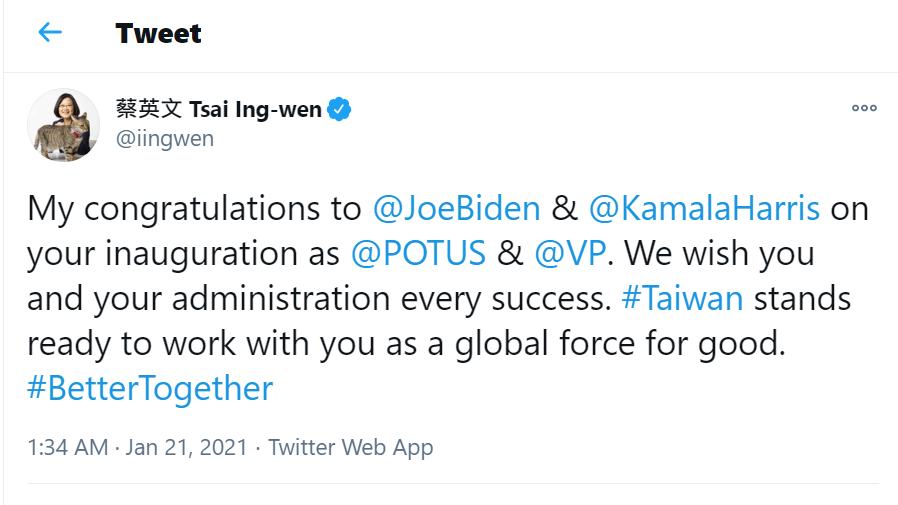With now former-President Donald Trump barely out the door of the White House, and political leaders around the world reevaluating their individual relationships with the incoming Biden Administration, Taiwan’s leaders have been quick to offer their congratulations to new President Joe Biden and his Vice-President, Kamala Harris.

None were quicker than President of Taiwan, Tsai Ing-wen, who took to Twitter in the early morning hours Taiwan time – 1.34am – to offer her “congratulations to @JoeBiden & @KamalaHarris on your inauguration” adding “We wish you and your administration every success” before closing with the commonly used “Taiwan stands ready” phrase seen so often trotted out on government Twitter accounts when tragedy or natural disaster strikes around the world – and Taipei makes moves to offer solidarity with affected nations.
Whilst the sentiment is no-doubt filled with good intent, less of the cookie-cutter linguistic approach to social media posting by those ultimately responsible for the Tweets issued by the current ruling Democratic Progressive Party (DPP) would, over time, demonstrate a much more meaningful and personal approach to such moments of historical importance by Taiwanese authorities.
In contrast to President Tsai’s Tweet, the leader of Taiwan’s opposition Kuomintang (KMT), Chiang Chi-chen, issued a full, well thought out release to the foreign media mid-morning rather than a limited-character Tweet in the middle of the night.

In doing so, he said “I would like to once again congratulate Mr. Biden and Ms. Harris on assuming the posts of United States (US) President and Vice-President, respectively” adding “I wholeheartedly look forward to the US playing the role of defender of peace and stability in the Asia-Pacific region and strengthening reciprocal collaboration and partnership between the Republic of China (ROC) and the US.”
Chiang continued “(T)his is especially important at this crucial point in time, as the entire global community is being confronted with numerous significant challenges” before he referred to a letter penned by then presidential candidate Biden to Chinese language media around the world in which Biden “mentioned Taiwan’s democratic, economic, and technological strength, as well as Taiwanese society, which has remained open and has, simultaneously, effectively contained the pandemic”, also mentioning “his wish that Taiwan collaborate with the US in order to promote the shared prosperity, security, and values of the Asia-Pacific region.”
Whether the average Taiwanese, legal resident from wherever they may originate, or casual political observers overseas agree with the politics of the KMT or not is unimportant – this is how government to government public communiques are done – in balanced and well thought out missives rather than in same-old, one-size-fits-all Tweet form; a methodology those currently in power in Taiwan would do well to observe in their social media management briefings.










